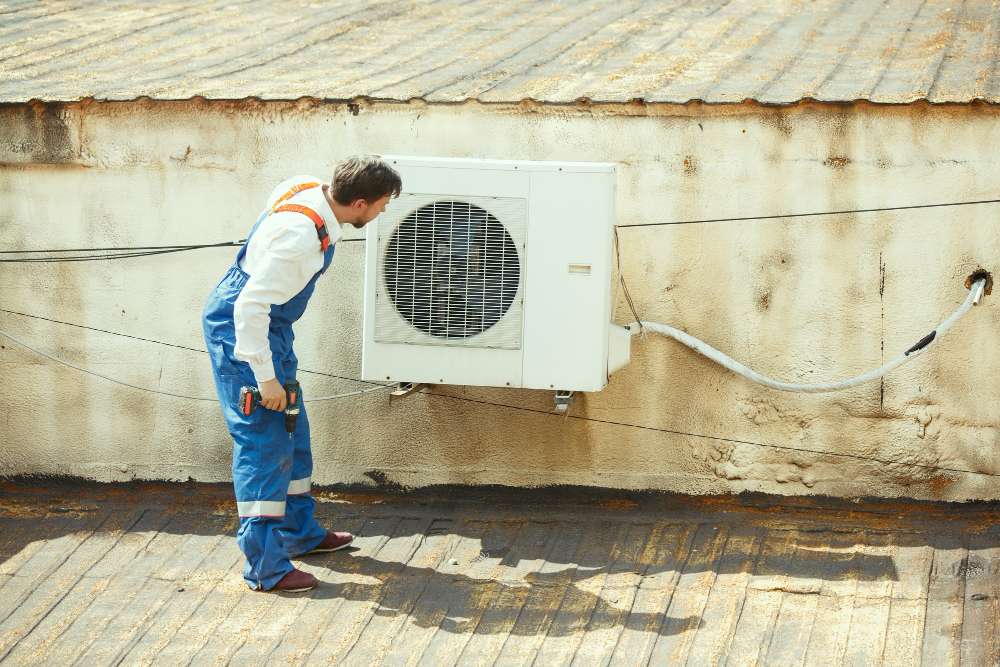Maintaining the right level of refrigerant in your air conditioning system is crucial for its efficiency and longevity. Refrigerant plays a pivotal part in the cooling process, ensuring your home remains comfortable during hot days. Understanding its importance and knowing when to seek professional help can help you avoid unnecessary expenses and ensure consistent cooling performance.
In this article, we’ll delve into the significance of proper AC refrigerant levels, signs of potential issues, and essential maintenance tips to keep your system running smoothly.
What are Refrigerants and How Do They Work?
Refrigerants are essential components in air conditioning systems responsible for cooling indoor spaces. They operate in a continuous cycle, transitioning between liquid and vapor states. The operation starts with the refrigerant absorbing heat from indoor air at the evaporator coil, turning it into vapor. It then travels to the condenser coil, where the heat is released outdoors as the refrigerant returns to a liquid state. This cycle efficiently regulates temperatures. Commonly used refrigerants include R-22 and R-410A.
Signs of Low AC Refrigerant Levels
When an air conditioning system has low refrigerant levels, it can result in reduced efficiency and potential damage to the unit. Recognizing the signs of low refrigerant levels early on can help prevent further issues. Here are some usual indicators to watch out for:
- Reduced Cooling Capacity
One of the most immediate signs is a noticeable decrease in the system’s ability to cool the indoor space effectively. If you find that your air conditioner is running longer cycles but isn’t producing sufficient cool air, it could be a sign of low refrigerant.
- Ice Buildup on Coils
When refrigerant levels are low, the evaporator coils can become excessively cold, causing condensation to freeze and accumulate on the coils. If you observe ice buildup on the indoor or outdoor coils, it’s a strong indication of a refrigerant issue.
- Warm Air from Vents
If warm air is blowing from the AC vents despite setting the thermostat to a lower temperature, it suggests that the cooling process isn’t functioning correctly—possibly due to insufficient refrigerant.
- Hissing or Bubbling Noises
A refrigerant leak can sometimes produce a hissing or bubbling sound as the gas escapes from the system. If you hear such noises near the AC unit, addressing the issue promptly is essential.
- Short Cycling
Short cycling refers to the frequent turning of the air conditioner on and off. Low AC refrigerant levels can cause the system to cycle more frequently as it struggles to maintain the set temperature, leading to premature wear and tear.
Consequences of Low AC Refrigerant Levels
Low refrigerant levels in an AC system can lead to a span of detrimental consequences, affecting both the performance and longevity of the unit. It is essential to be aware of these potential outcomes to address refrigerant issues promptly. Here are the critical consequences associated with low AC refrigerant levels:
- Increased Energy Consumption
A system operating with low AC refrigerant levels must work harder and longer to achieve desired temperatures. This increased workload translates to higher energy consumption, resulting in elevated utility bills.
- Compressor Damage
The compressor is a critical component responsible for circulating the refrigerant. Low AC refrigerant levels can cause the compressor to overheat due to inadequate lubrication and cooling, potentially leading to compressor failure—a costly repair that may necessitate system replacement.
- System Strain and Wear
Operating with insufficient refrigerant places undue strain on various system components, including the compressor, fans, and coils. This strain accelerates wear and tear, reducing the system’s lifespan and increasing the likelihood of component failures.
- Inconsistent Temperature Control
A system with low AC refrigerant levels may produce inconsistent cooling, resulting in temperature fluctuations throughout the space. This inconsistency compromises comfort and can lead to hot spots or uneven cooling distribution.
- Elevated Humidity Levels
Refrigerant plays a crucial role in dehumidifying the air as it cools. Low refrigerant levels can diminish the system’s dehumidification capacity, leading to increased indoor humidity levels and a more uncomfortable environment.
- Potential Refrigerant Leaks
Low AC refrigerant levels are often indicative of a leak within the system. Continual operation with a leak can lead to further refrigerant loss, exacerbating the aforementioned consequences and potentially causing environmental harm.
Maintaining Proper AC Refrigerant Levels

Ensuring the correct refrigerant levels in your air conditioning system is fundamental to its efficient operation and longevity. Proper maintenance and vigilant oversight can prevent a range of issues associated with low refrigerant levels. Here’s a guide to maintaining the optimal refrigerant levels in your AC:
- Regular Inspections
Schedule routine inspections by qualified HVAC professionals to check AC refrigerant levels and overall system performance. Regular AC maintenance can detect probable issues early, preventing them from escalating into more substantial problems.
- Refrigerant Leak Detection
Implement leak detection services to identify and address refrigerant leaks promptly. Leaks can lead to a gradual decline in refrigerant levels, compromising system efficiency and potentially causing environmental harm. Technicians use specialized equipment to locate and seal leaks effectively.
- Correct Refrigerant Type
Ensure that the correct type of refrigerant is used for your specific AC system. Using the wrong refrigerant can impair system performance, void warranties, and result in system damage. Consult your system’s manufacturer or a professional technician to determine the appropriate refrigerant type.
- Refrigerant Recharging
If refrigerant levels are found to be low during inspections, the system may require recharging. Technicians can replenish refrigerant levels to the manufacturer’s specifications, restoring optimal system performance and efficiency.
- Seal and Insulate Ductwork
Properly sealed and insulated ductwork minimizes air leaks and ensures efficient airflow, reducing the strain on the AC system. Enhanced airflow contributes to better heat exchange and more effective cooling, complementing proper refrigerant levels for optimal performance.
Tips for Extending AC Refrigerant Lifespan
Proper care and maintenance are vital for maximizing the lifespan of AC refrigerants. Preserving the refrigerant ensures efficient heat exchange, consistent cooling, and reduces the likelihood of costly repairs. Here are essential tips to extend the lifespan of your AC refrigerant:
- Proper Ventilation Maintenance
Ensure that the ventilation system is well-maintained and free from obstructions. Adequate ventilation supports efficient heat exchange and helps the refrigerant maintain its effectiveness.
- Humidity Control
Implement measures to regulate indoor humidity levels. Excessive humidity can strain the refrigerant system, leading to increased wear. Use dehumidifiers or ensure proper ventilation to maintain optimal conditions.
- Timely Filter Replacement
Regularly replace air filters on schedule to prevent contaminants from entering the system. Clean filters contribute to unrestricted airflow, reducing the workload on the AC system and supporting refrigerant efficiency.
- Optimized Thermostat Settings
Avoid constant adjustments to thermostat settings. Set temperatures to a comfortable yet stable level to minimize frequent system cycling. Consistent operation reduces unnecessary strain on the refrigerant.
- Educate Users on System Usage
Inform occupants or users about the proper usage of the AC system. Encourage responsible and energy-efficient practices, such as avoiding unnecessary temperature changes and ensuring doors and windows are closed when the system is functioning.
AC Refrigerant Levels FAQs
What is the role of refrigerant in the AC system?
The refrigerant in an AC system circulates, transforming from a low-pressure gas to a high-pressure fluid. Along this process, it absorbs heat from indoor spaces and dissipates it outdoors, facilitating the cooling of your home’s air.
What determines the efficiency of an air conditioner?
The efficiency of an air conditioner is determined by its Energy Efficiency Ratio (EER), which is the ratio of cooling capacity (Btu per hour) to power input (watts). A higher EER indicates greater efficiency. EER is a crucial metric, as it directly reflects the unit’s ability to cool efficiently in relation to its power consumption.
Why is the proper amount of refrigerant important?
The proper refrigerant charge enhances moisture removal, maintaining indoor humidity around 40% and ensuring comfort. Adequate refrigerant levels lead to longer-lasting, more efficient air conditioners with reduced cycling and lower electricity consumption.
What makes an AC energy efficient?
AC energy efficiency is influenced by factors like SEER rating, size, and technology. Higher SEER ratings indicate better efficiency. Proper sizing ensures optimal performance without excess energy use. Advanced technologies, such as variable-speed compressors, improve efficiency by adjusting to cooling demands. Regular maintenance and clean filters also help maintain peak efficiency.
Which AC is most energy-efficient?
The most energy-efficient AC units often have a high Seasonal Energy Efficiency Ratio (SEER) rating. In general, ductless mini-split systems and inverter technology-based ACs tend to be more energy-efficient.
Conclusion
Understanding the importance of AC refrigerant levels ensures your air conditioner operates efficiently and reliably. Proper attention to these levels can save you from costly repairs and keep your home comfortable during hot days. Regular checks and timely interventions are key to a longer-lasting AC system.
At Tropic Air Conditioning Inc., we prioritize your comfort and efficiency. Trust us for expert AC maintenance, ensuring optimal refrigerant levels and longevity for your system. Contact us today!




